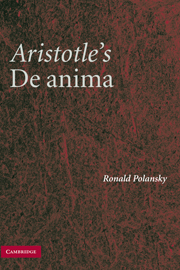Book contents
- Frontmatter
- Contents
- Preface
- List of Abbreviations
- Introduction
- COMMENTARY ON DE ANIMA: : Book 1
- COMMENTARY ON DE ANIMA: Book 2
- COMMENTARY ON DE ANIMA: Book 3
- 1 In the World As It Is There Can Be but the Five Senses
- 2 What Allows for Perceiving That We Perceive; Sense Joins in a Common Power so That the Five Senses Are Subfaculties of a Central Sense Faculty
- 3 Distinguishing Sense and Thought; What Is Phantasia?
- 4 What Is Mind as That Capable of Thinking All Things
- 5 What Enables Thinking to Occur
- 6 The Sorts of Intelligible Objects
- 7 Phantasia Has a Role in All Thinking
- 8 That Mind Can Think All Things
- 9 There Is a Capacity for Progressive Motion
- 10 The Desiderative Capacity Is the Primary Cause of Progressive Motion
- 11 Even the Simplest Animals Have Indefinite Phantasia, and Calculative Phantasia Fits the Account of Progressive Motion
- 12 The Necessary Order of the Faculties of Soul
- 13 The Sort of Body Requisite to Support the Order of the Faculties of Soul
- Bibliography
- Index
4 - What Is Mind as That Capable of Thinking All Things
Published online by Cambridge University Press: 18 December 2009
- Frontmatter
- Contents
- Preface
- List of Abbreviations
- Introduction
- COMMENTARY ON DE ANIMA: : Book 1
- COMMENTARY ON DE ANIMA: Book 2
- COMMENTARY ON DE ANIMA: Book 3
- 1 In the World As It Is There Can Be but the Five Senses
- 2 What Allows for Perceiving That We Perceive; Sense Joins in a Common Power so That the Five Senses Are Subfaculties of a Central Sense Faculty
- 3 Distinguishing Sense and Thought; What Is Phantasia?
- 4 What Is Mind as That Capable of Thinking All Things
- 5 What Enables Thinking to Occur
- 6 The Sorts of Intelligible Objects
- 7 Phantasia Has a Role in All Thinking
- 8 That Mind Can Think All Things
- 9 There Is a Capacity for Progressive Motion
- 10 The Desiderative Capacity Is the Primary Cause of Progressive Motion
- 11 Even the Simplest Animals Have Indefinite Phantasia, and Calculative Phantasia Fits the Account of Progressive Motion
- 12 The Necessary Order of the Faculties of Soul
- 13 The Sort of Body Requisite to Support the Order of the Faculties of Soul
- Bibliography
- Index
Summary
Since chapter 3 has distinguished sense and thought, it has already begun the treatment of mind or intellect. Clearly chapters 4–8 complete the treatment. This section on the mind is much more tightly organized than it may appear. Chapter 4 sets out what mind is through consideration of the analogy and disanalogy with sense. The main assumption of this chapter is that mind can think all intelligible things, while each sense has a limited range. On the basis of this assumption mind turns out unmixed and separate. Nevertheless, humans acquire knowledge so that they somehow have the intelligible objects right in the soul, though hardly so as to restrict thinking but to foster it. This raises the question taken up especially in chapter 5 of what can get humans thinking if they already have intelligible objects somehow in soul. It will be seen that the very intelligible objects that we have in mind enable us to think. But they do not lead us always to be thinking since the phantasma resulting from sense is also needed to stimulate thinking. Chapter 6 will focus upon the various intelligible objects. Chapter 7 will defend the role of phantasia in initiating thinking. And chapter 8 will return to justify the initial assumption of the whole investigation, that is, that mind can think all things. Thus the treatment of mind is quite clear in its design.
The previous chapter argued that sense and thought differ.
- Type
- Chapter
- Information
- Aristotle's De AnimaA Critical Commentary, pp. 434 - 457Publisher: Cambridge University PressPrint publication year: 2007



